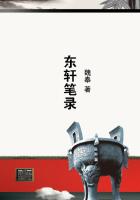The astronomer who hated women generally caused her so much puzzling speculation that she one day asked Mr Stelling if all astronomers hated women, or whether it was only this particular astronomer.But, forestalling his answer, she said, `I suppose it's all astronomers: because you know, they live up in high towers, and if the women came there, they might talk and hinder them from looking at the stars.'
Mr Stelling liked her prattle immensely, and they were on the best terms.
She told Tom she should like to go to school to Mr Stelling, as he did, and learn just the same things.She knew she could do Euclid, for she had looked into it again, and she saw what A B C meant: they were the names of the lines.
`I'm sure you couldn't do it, now,' said Tom.`And I'll just ask Mr Stelling if you could.'
`I don't mind,' said the little conceited minx.`I'll ask him myself.'
`Mr Stelling,' she said, that same evening, when they were in the drawing-room, `couldn't I do Euclid, and all Tom's lessons, if you were to teach me instead of him?'
`No; you couldn't,' said Tom, indignantly.`Girls can't do Euclid: can they, sir?'
`They can pick up a little of everything, I daresay,' said Mr Stelling.
`They've a great deal of superficial cleverness: but they couldn't go far into anything.They're quick and shallow.'
Tom, delighted with this verdict, telegraphed his triumph by wagging his head at Maggie behind Mr Stelling's chair.As for Maggie, she had hardly ever been so mortified: she had been so proud to be called `quick' all her little life, and now it appeared that this quickness was the brand of inferiority.It would have been better to be slow, like Tom.
`Ha, ha! Miss Maggie!' said Tom, when they were alone, `you see it's not such a fine thing to be quick.You'll never go far into anything, you know.'
And Maggie was so oppressed by this dreadful destiny that she had no spirit for a retort.
But when this small apparatus of shallow quickness was fetched away in the gig by Luke, and the study was once more quite lonely for Tom, he missed her grievously.He had really been brighter and had got through his lessons better since she had been there; and she had asked Mr Stelling so many questions about the Roman Empire, and whether there really ever was a man who said in Latin, `I would not buy it for a farthing or a rotten nut,' or whether that had only been turned into Latin - that Tom had actually come to a dim understanding of the fact that there had once been people upon the earth who were so fortunate as to know Latin without learning it through the medium of the Eton Grammar.This luminous idea was a great addition to his historical acquirements during this half year which were otherwise confined to an epitomised History of the Jews.
But the dreary half year did come to an end.How glad Tom was to see the last yellow leaves fluttering before the cold wind! The dark afternoons and the first December snow seemed to him far livelier than the August sunshine; and that he might make himself the surer about the flight of the days that were carrying him homeward, - he stuck twenty-one sticks deep in a corner of the garden when he was three weeks from the holidays, and pulled one up every day with a great wrench, throwing it to a distance, with a vigour of will which would have carried it to limbo, if it had been in the nature of sticks to travel so far.
But it was worth purchasing, even at the heavy price of the Latin Grammar - the happiness of seeing the bright light in the parlour at home as the gig passed noiselessly over the snow-covered bridge: the happiness of passing from the cold air to the warmth and the kisses and the smiles of that familiar hearth where the pattern of the rug and the grate and the fire-irons were `first ideas' that it was no more possible to criticise than the solidity and extension of matter.There is no sense of ease like the ease we felt in those scenes where we were born, where objects became dear to us before we had known the labour of choice, and where the outer world seemed only an extension of our own personality: we accepted and loved it as we accepted our own sense of existence and our own limbs.Very commonplace, even ugly, that furniture of our early home might look if it were put up to auction:
an improved taste in upholstery scorns it; and is not the striving after something better and better in our surroundings, the grand characteristic that distinguishes man from the brute - or, to satisfy a scrupulous accuracy of definition, that distinguishes the British man from the foreign brute?
But heaven knows where that striving might lead us, if our affections had not a trick of twining round those old inferior things, if the loves and sanctities of our life had no deep immovable roots in memory.One's delight in an elderberry bush overhanging the confused leafage of a hedgerow bank as a more gladdening sight than the finest cistus or fuchsia spreading itself on the softest undulating turf, is an entirely unjustifiable preference to a landscape-gardener, or to any of those severely regulated minds who are free from the weakness of any attachment that does not rest on a demonstrable superiority of qualities.And there is no better reason for preferring this elderberry bush than that it stirs an early memory - that it is no novelty in my life speaking to me merely through my present sensibilities to form and colour, but the long companion of my existence that wove itself into my joys when joys were vivid.















